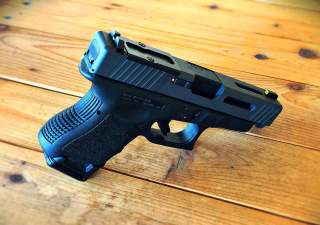A Combo Weapon: Why the Glock 26 Is Made of so Many Guns
All you wanted to know.
Key point: This weapon, the Glock 26, took the best ideas from several different weapons and combined them.
One of the most competitive markets in the world of handguns is the subcompact market. Guns with short barrels and small magazines, subcompacts are meant for those who favor carry-ability over firepower and range. The Glock 26, referred to by the company itself as the “Baby Glock,” is a compact weapon that can carry as much ammunition as full-sized nine millimeter handguns.
The Glock 26 was released in 1994 and was designed from the outset for the fields of home defense, law enforcement and concealed-carry weapons. The subcompact Glock 26 followed up on the compact Glock 19, which, in turn, was a smaller version of the original Glock 17. With each iteration, Glock simultaneously improved the overall design and made it smaller and more useful to concealed carriers and those who needed a discrete handgun.
A comparison between the Glock 17 and Glock 26 is illustrative. Both are nine millimeter Luger handguns, and they both use the same striker-fired operating system, known as “Safe Action.” The company designed the gun’s three internal safeties so that the gun owner must disengage them in order to fire the weapon. Both have the same 5.5 pound trigger pull with half-inch trigger travel. At 1.18 inches, both guns are even the same width. All of this is important as it allows new or existing gun users to pick up a larger Glock 17 (or Glock 19) as a first gun and then purchase a smaller Glock 26 without having to learn the ins and outs of a new firearm. From manual of operation to feel, the Glock 26 is for all intents and purposes the same gun.
However, it is important to note that the dimensions and ammunition capacity of the two guns diverge in separate—but equally useful—directions. The Glock 26, at 6.41 inches, is more than an inch and a half shorter than the Glock 17. The Glock 26 weighs 21.71 ounces unloaded, a quarter pound less than the Glock 17, and weighs even less loaded due to the smaller magazine. The Glock 26 takes a ten-round double-stack magazine, while the Glock 17 takes a seventeen-round magazine.
The Glock 26’s magazine system is the largest and most versatile in its class. One competitor, the Smith & Wesson M&P Bodyguard, can store just six .380 caliber rounds. Another, the Beretta Nano, carries eight nine-millimeter Luger rounds. The Glock 26, on the other hand, takes ten nine-millimeter rounds in a double-stack magazine, all while remaining just over an inch wide and maintaining a relatively short grip. In the interest of keeping the grip short the Glock 26 lacks a flared magwell. (Some individuals find the Glock subcompact’s grip a little too short, and for them there are inexpensive thirty party grip extensions that provide a larger grip surface.)
The Glock 26 trades magazine capacity for compactness. But it does have the ability to gain back that firepower at the expense of carry-ability if the user so wishes. The “Baby Glock” G26 will also take the Glock 19’s fifteen-round magazine, the Glock 17’s seventeen-round magazine, and even Glock’s submachine gun-sized thirty-three-round stick magazine without modification.
Glock periodically pushes out new versions of its handguns, conservatively adding new features when they become available. In 2018, Glock introduced the Gen 5 Glock 26. The Gen 5 features the Glock Marksman Barrel with enhanced right-hand polygonal rifling and an improved barrel crown. The Gen 5 also includes a new dot pattern on the grip, backstrap and front strap for a better hold, ambidextrous slide stops, and a new slide finish, called nDLC, for protection from corrosion and wear. Missing in the Gen 5 are finger grooves, which are redundant with the new grip pattern.
The Glock 26 is actually several handguns in one. At its core it is a subcompact pistol with a larger than average magazine capacity. Alternately, it is a handgun with a standard seventeen-round magazine capacity. Finally, it can be a thirty-three-round blaster for target plinking at the range. The “Baby Glock” isn’t just a contender for concealed carry enthusiasts, it’s also a viable option for everyone else as well.
Kyle Mizokami is a defense and national-security writer based in San Francisco who has appeared in the Diplomat, Foreign Policy, War is Boring and the Daily Beast. In 2009, he co-founded the defense and security blog Japan Security Watch. You can follow him on Twitter: @KyleMizokami. This first appeared in June 2018.
Image: Imgur

